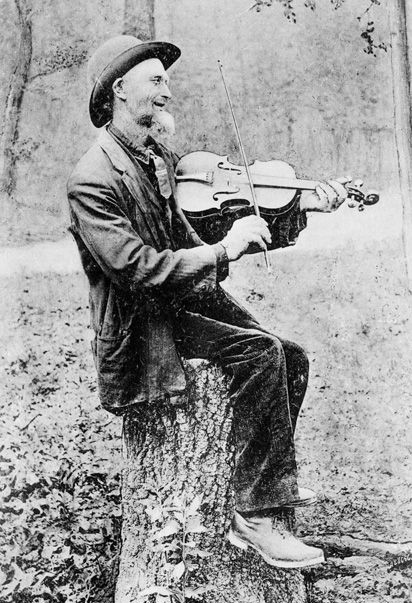In days gone by, there was fiddler in County Down. He was one of the best at playing the old tunes, many of which had long been forgotten by other fiddlers.
The fiddler lived alone in the Mourne Mountains. He played his fiddle every day, almost always for his own personal enjoyment. But from time to time, he ventured into the nearest village. He found a rock, or a log, or a bench, somewhere in the village and he began to play. The villagers looked forward to those occasions, and they eagerly gathered around to listen to his vast repertoire of tunes.
At the same time, there was a college professor in Belfast. He taught music. He also conducted the college orchestra.
This professor had traveled the world and heard the world’s greatest violin virtuosos, each of whom had mastered the classics. He had also heard many, many brilliant fiddlers – equally talented musicians use the violin to play folk tunes.
The professor heard about the County Down fiddler and was somewhat surprised. If you don’t know your geography – well, shame on you. But Belfast straddles both County Antrim and County Down.
Down, as the name of the county, does not mean the opposite of “up”. It comes from “dunn”, the Irish word for fort. “Dun” is in many Irish place names – like Donegal and Cushendun. For some reason, known only to the English, this Irish county has a “w” in its English spelling, and thus is pronounced Down – as in the opposite of UP, rather than County Dun. Anyway, that is a diversion from the story. I sometimes get sidetracked.
The professor was surprised to hear about the fiddler from County Down, because the professor had, he thought, heard the very best fiddlers in the world. And now, he hears, that the best fiddler in the world might just be this fiddler from County Down – the very same corner of the world as the professor.
And so, the professor made the short journey into the heart of County Down, hoping to hear the fiddler for himself.
When he got to the village frequented by the fiddler, the fiddler of course was not there. The professor got a room at the local inn and waited for the fiddler to make an appearance.
Sure enough, a few days later, the fiddler entered the village. The professor, per chance, was sitting on a bench in the village square and watched as the fiddler found his own bench, just a few feet away. The fiddler pulled out his fiddle from its case, spent a few moments tuning his instrument, and then began to play.
It was not long at all before villagers gathered around. And everyone in the audience, including the professor, were awe. The performance was indeed brilliant.
The fiddler played some upbeat tunes, and those around him could not help but dance. And he played some somber, melancholy tunes, and those around him could not help but cry.
When he was finished, and started to pack his fiddle, the professor approached him. He said: “I don’t believe I’ve ever heard a better fiddler in all of the world. Will you please play me one more tune, and make it your favorite tune of all?”
“Thank you for the compliment”, said the fiddler, “and I will indeed play you my favorite tune”.
The fiddler then played a tune that was, perhaps, the most wonderful tune ever played. The fiddler poured his heart and his soul in the performance.
The effort brought a tear to the eye of the professor, who stated: “I’ve never heard that tune before and you played it beautifully. What, pray tell, is the name of that tune?”
The fiddler replied: “This is called ‘The Day The Moon Crashed Into Ireland’”.
The professor, being a professor, felt compelled to correct the fiddler, and said “It is a good tune, which you play well, but of course, the moon has never crashed into Ireland.”
The fiddler reflected a bit, and then said: “Well, scientists differ.”
Postscript
This is my adaptation of an old Appalachian tale. As homage, I used an old photograph of an American fiddler from Arkansas, from Shiloh Museum of Ozark History.
